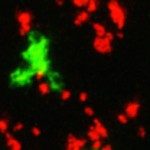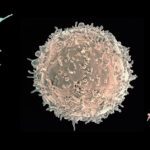CAR T cells represent a promising new anti-cancer strategy, demonstrating interesting results against B-cell malignancies in clinical trials. But the mechanisms at play remain elusive, especially regarding the potential role of the tumor microenvironment (TME).
We used intravital imaging to observe the action of different subtypes of CAR T cells in a murine model of B cell lymphoma. We found that CD8+ CAR T cells kill their target through cell-contact more frequently than CD4+ CAR T cells. Using single-cell RNA sequencing and flow cytometry, we demonstrated that CD4+ CAR T cells have a more profound impact on the TME than CD8+ CAR T cells and mediate more efficiently the recruitment and activation of host immune effectors. CAR T cell-derived interferon-γ (IFN-γ) is key not only for host immune activation but also to maintain CAR T cell cytotoxic phenotype. With intravital imaging, we show that IFN-γ deficient CAR T cells exhibit sharply decreased killing rates. IFN-γ sensing by host immune cells and host IL12 production in the TME appear essential to maintain CAR T cell cytotoxic phenotype.
Our study shows CD4+ and CD8+ CAR T cells have shared and unique functions in vivo against tumor cells and their cytotoxic activity relies on an efficient crosstalk with the TME.
Source
A cross-talk between CAR T cell subsets and the tumor microenvironment is essential for sustained cytotoxic activity, Science Immunology, March 26, 2021
To read the article: here
To read the press release: here






